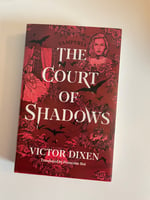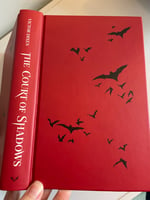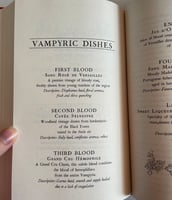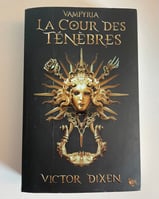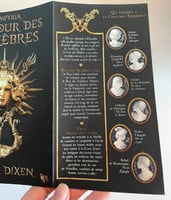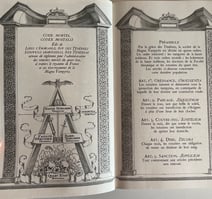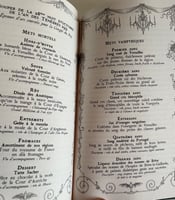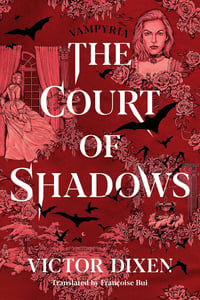 A few months ago, I was offered a copy of a book that's essentially catnip for me: The Court of Shadows, by Victor Dixen, out today! This is a long review, so here's the quick version:
A few months ago, I was offered a copy of a book that's essentially catnip for me: The Court of Shadows, by Victor Dixen, out today! This is a long review, so here's the quick version:
The Court of Shadows is a vampire novel set in a school at an alternate Versailles. There's a young heroine out for revenge, a bunch of scheming nobles and ever-present danger. It's like a cross between the Versailles TV show, Vampire Academy and Anne Rice. The vampires are beautiful, but so evil they're not romance candidates. There is a touch of romance, but that's not the point of the novel at all. Read it for the vengeful, stabby heroine and the bloody, dangerous world.
*
The Vampyria series is set in an alternate France--largely at Versailles--in which Louis XIV was "transmuted" into a vampire instead of ending his reign. Now it's 299 years later and most of the world is either ruled by vampires or allied with them. Commoners (humans without noble status or medical training) live under an oppressive Mortal Code, which requires them to stay within one league of their bell tower, stay in their homes after dark and tithe 1/10 of their blood each month to feed the vampires in exchange for "protection."
This protection is, as you might guess, dubious at best. Jeanne, our seventeen year old heroine, has no illusions. The elaborate web of lies told to the fourth estate (commoners) is flimsy at best. Still, commoners are essentially caged and have no physical or class mobility. The parallel between the monarchy and aristocracy and literal bloodsuckers is not subtle.
Jeanne's family is eating dinner one night when guards knock on the door, burst in and murder everyone but Jeanne and her brother Bastien. Turns out her family had been keeping a secret from her: they were members of the rebellion and her father's apothecary lab was for more than just medicines. Jeanne and Bastien escape to the home of his secret girlfriend (so many secrets), the daughter of the local feudal lord. Except she's been betrayed by her father and in one big, bloody scene, Bastien, his girlfriend, the Baron and his guard are all slaughtered.
Here's how we know this is an historical fantasy horror revenge novel: after murdering the Baron, Jeanne smashes Diane's face into the stone floor until her body is unrecognizable and trades clothes with her so that when the vampire who's just arrived outside discovers the scene, she can take Diane's place. Not only is Jeanne capable of spectacular violence, Dixen hasn't sanitized it. She doesn't shoot someone with a crossbow and they instantly die. No, it's more of a cinematic Anne Rice-style style.
Jeanne/Diane is swept off to Versailles to become the King's ward and into a training school for young nobility seeking to become one of the King's chosen. She learns on the journey that the vampire transporting her is not the friendly, handsome, forever-nineteen-year-old he presents himself as. After a couple of days on the road, he brags about having drained her mother's dying body dry and carrying the leftovers in his flask. Jeanne regrets not killing him while he slept and resolves to do so as soon as possible.
Instead of sending Jeanne to etiquette school and suspending the action until the end of the novel, Dixen never lets the reader forget how dangerous--and creepy--The Court of Shadows is. Forced bloodletting, a human hunt, vampire-specific dining menus, secrets and lies that could get Jeanne killed... This is a book that grabs on an doesn't let go.
The language and customs in the book are an interesting mix of 1700's and present. Technology hasn't advanced to that of today, but Jeanne uses a bathtub with hot water on demand soon after coming to the palace. There's a scene in which Alexandre asks Jeanne for a high five and I immediately went to the original text to double-check. Yep, there's a high five. The Internet, a highly reputable source, tells me that the high five became a thing in the 1970's. By setting the novel 300 years after Louis XIV became a vampire, Dixen has created a world in which he can play as much as he wants. He kept much of the elaborate court dress and customs, but changed a lot, too.
While the novel is set in France, there are students from several other countries in Jeanne's classes, including Japan, England, Spain and India, some of whom are queer. There's also a Black student from Louisiana, described as having "an African mother and a French father." I had some questions about that, especially since the French began enslaving African people in Louisiana in 1710 and would presumably not have had any reason to stop given the powerlessness of humans in this world. Of course Louisiana would have remained under French control in this alternate history and it was interesting to consider why some of the geopolitical structures evolved as they did, especially those that are mentioned only on the periphery.
I was lucky enough to receive a copy of the French edition as well, so I was able to compare the translation to the original. It's a faithful translation, with differences mostly to account for word play and idioms that don't make as much sense in English. The translation isn't clunky, however, and the characters come through with personalities intact. The physical U.S. copy I received is hardcover, with a red dustjacket illustrated in the style we recognize as toile. The French edition is softcover, with jacket flaps that hold cameo illustrations of several book characters. I love that detail, so I was excited to see those in the inside pages of the U.S. edition. Some of the inside details are different, but the meaning stays the same. We get a glorious map, a list of characters, some of the Mortal Code and social structure, etc.
The U.S. version also has bats! Photos below.
The Vampyria series was originally published in France and was translated by Françoise Bui for the U.S. release.
You can pick up a copy at Amazon. It's currently in Kindle Unlimited with Whispersync. I haven't listened to the audiobook, but it's narrated by Carlotta Brentan, who did the excellent voice and accent work in that audio versions of Diana Biller's last two novels.
*
Photos from the U.S. edition, with French original following:
